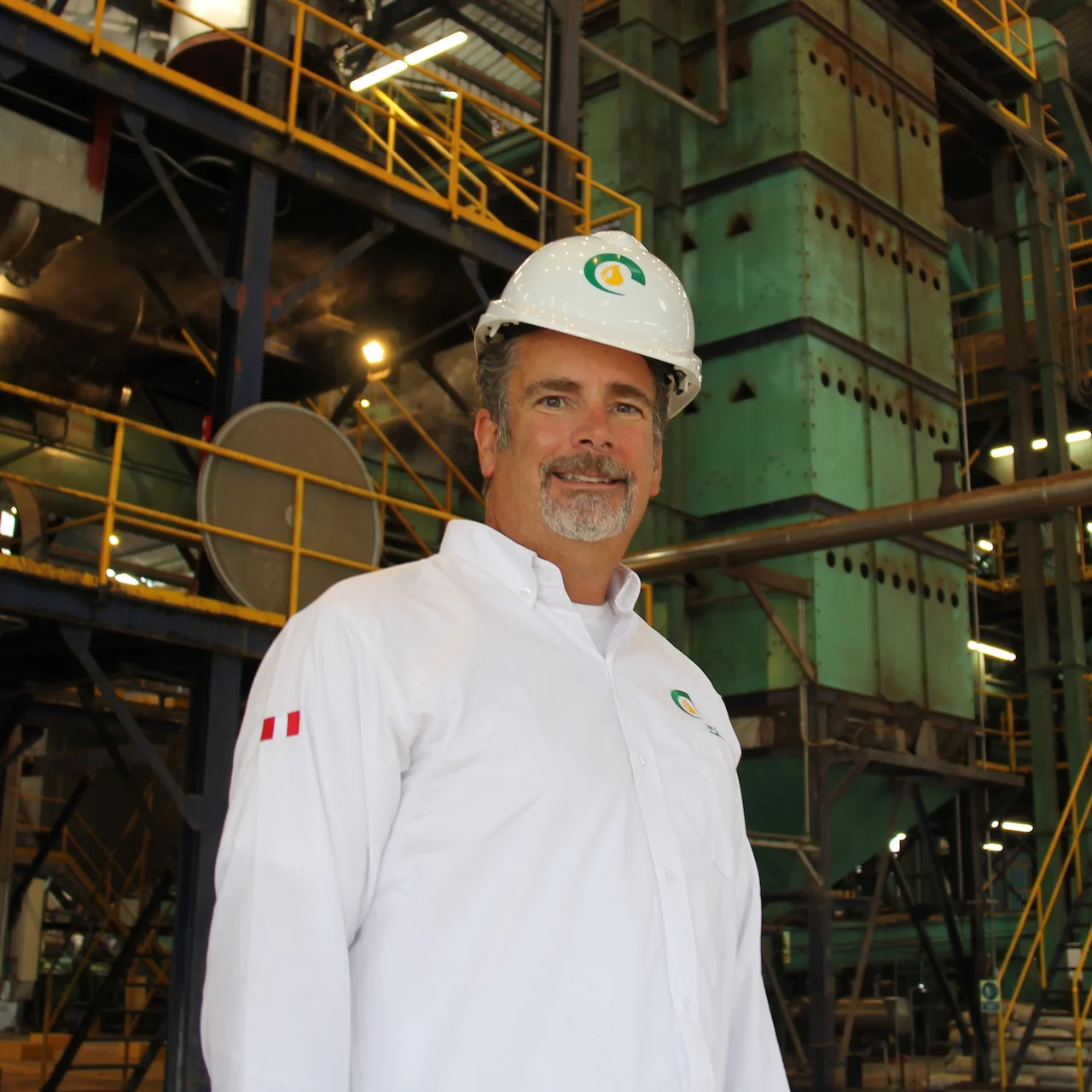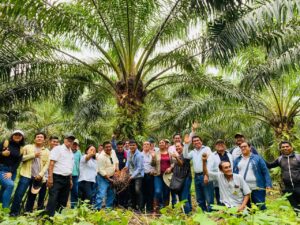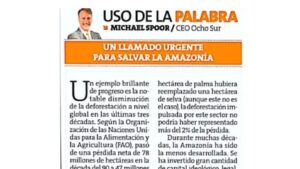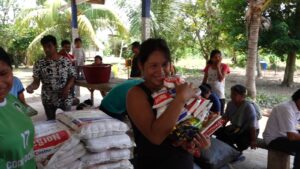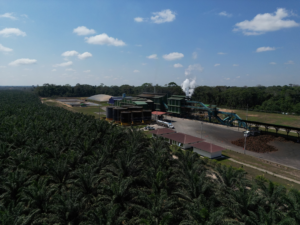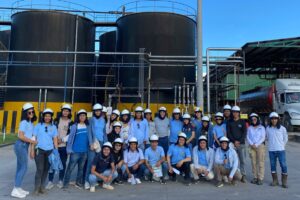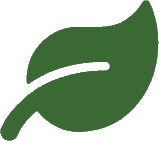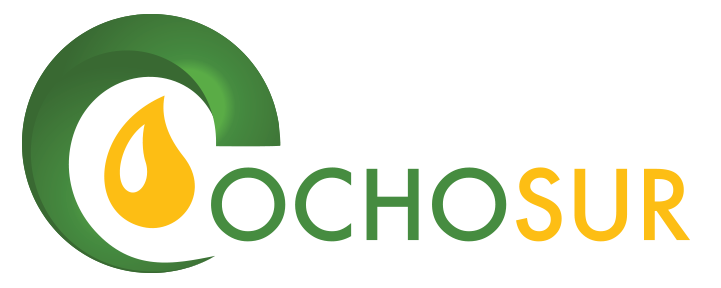Palm oil has displaced wood for the first time as the main generator of foreign currency in Ucayali. To achieve this, the American company Ocho Sur has invested US$150 million in the last five years.
Few people realize it, but oil palm is present in many of the things we consume daily. Soaps, cosmetics, toothpaste, chocolates, cereals and even ice cream. All are made with palm oil, the most consumed vegetable fat in the world. One of the largest producers of this input in Peru is Ocho Sur, a company that has a positive impact on the economy of Ucayali, despite some critical voices. About this, we spoke with Michael Spoor, its CEO, in this interview.
—Ocho Sur operates in Ucayali, but oil palm is grown throughout the Amazon. Can you explain to us the size of the business you run?
The palm industry is very small in Peru. It covers 90 thousand hectares (Ha) that represent 0.1% of the surface of the Peruvian Amazon. Of that, Grupo Palmas (Romero) owns around 20 thousand hectares, we own 10 thousand, and the rest is managed by chains of small and medium-sized palm growers. In the case of Ucayali, we operate the largest and most modern palm oil extraction plant, but there are other small players that also have facilities.
—How much palm oil does Ocho Sur produce?
We now process 45 tons per hour of oil palm. We are working almost at full capacity, because we are at the peak of the harvest. And what we produce is crude palm oil. In 2021 we close with approximately 200 thousand tons of processed fruits and 50 thousand tons of oil production.
—Where do you sell your production?
The majority is exported to the international market. We are selling to some local customers because it is always better to sell in the country, but the majority are sold abroad. We have exported to Africa, Europe and other Latin American countries.
—How much do you export annually?
In 2021 there will be close to US$50 million of palm oil. We produce this in our two plantations, which represent just 0.1% of the surface of Ucayali, but generate 50 percent of the exports of this region. In 2020 we represent 39 percent of exports and in 2021 we will exceed 50 percent.
—Are you referring to half of Ucayali’s total exports or just agroindustrial exports?
To total exports. Ucayali’s first export product has always been wood. This is the first time that it will be displaced by oil palm as the main source of foreign exchange.
—How much have they invested in Ucayali?
In total, the investment between the agricultural part and the industrial part is, more or less, US$150 million, which is one of the largest agroindustrial investments, if not the largest, in the Peruvian jungle.
—Has most of it been in the extraction plant?
In the industrial part we operate the mill, which we inaugurated in March 2020 with US$20 million of investment to date. But the greatest investment has been the acquisition of the plantations and the maintenance of the crops. We invested a lot of money to change agricultural practices (in Ucayali) and develop a sustainable business, doubling the productivity of crops in the region. Because, if we can double productivity, we don’t need to touch more forests.
—Do you plan to expand your production capacity?
Our plantations are still young and are producing more and more each year. In these months, for example, we have a peak in production because it is the height of the harvest. So, over the next year and the year after, we are going to invest in doubling the production capacity of our plant.
—How much do you plan to invest?
The total should be around US$7 million or US$8 million. The plant now has a capacity of 45 tons per hour and will increase to 90 tons. As it was designed in a modular way, precisely for this expansion, it will require a smaller investment than the initial US$20 million.
—Who are the shareholders of the company?
There are two: Anholt Services and Amerra Capital, both from the United States. Anholt is a family office based in Connecticut, owned by a Danish family. And Amerra is a private banking company that finances projects in food and agriculture and manages US$5 billion in the world. But Ocho Sur is his only investment in palm.
—Why were the shareholders of Ocho Sur interested in the palm?
The reason is that they were one of the creditors who lent money for the development of the previous company. The business was started by a businessman who got into trouble and the creditors decided to go out and execute their guarantee. And, basically, what we did was acquire two estates that were in the process of being auctioned by a trust managed by La Fiduciaria. That is where the transfer of assets takes place and Ocho Sur begins in 2016.
—Did Ocho Sur acquire the plantations in progress? Have you not cultivated?
What we did was buy, in 2016, the plantations that were already developed. But we never thought about planting palm. We have bought the plantations with the crops standing, and the investments have been to improve productivity, to build the factory and create a sustainable business. We have not planted palm since our entry into Peru.
PRIOR CONSULTATION AND OEFA
—Is it true that the Ocho Sur plant was built without carrying out a prior consultation process, as local media points out?
I am not an expert on the subject, but I understand that prior consultation is a job of the Government. This journalistic complaint refers to the community of Santa Clara de Uchunya, which is located seven kilometers from the plant, on the other side of the Aguaytía River. We have an excellent relationship with that community, but there are certain NGOs that try to invent conflicts between the company and the population for their own benefit. Outside of that, there is a report from the Ministry of Culture that indicates that this population is not located in the area of direct or indirect influence of the project.
—The plant didn’t need prior consultation then?
What our legal advisors have told us is that prior consultation is carried out when there is a direct impact on native communities. Santa Clara de Uchunya does not have any interaction with our plant, but the communities that are part of our area of influence have gone through a process of citizen participation.
—We also see that Oefa initiated a sanctioning process against Ocho Sur for affecting forest soils. What is this fine due to?
That was an Oefa audit, promoted by a well-known NGO in Peru that constantly launches false complaints against our company. As a result, Oefa made certain observations, one of which was that we did not have an environmental permit to operate, and another that there was contamination of the forest soil. But then they realized that we have the permits to operate, so they voided that first fine.
—And the second fine?
We also went to reconsideration. We appealed to the Oefa court, and it agreed with us, making it clear that the company does not cause any type of impact on forest soils. Both issues were resolved, but the reputational damage has already been done, as was the objective of this complaint.
—Does that mean that in the end the company was not fined?
Nothing. Zero fines. Everything was without effect. And these two issues that were highly publicized by media related to NGOs, were without effect and were resolved one hundred percent in favor of the company.
—At a global level, the palm industry faces many complaints. Not only in Peru.
Unfortunately, the industry is stained by what happened in Indonesia, where all the forests were cut down to grow palm. But that was a state decision so that the population could benefit and live from it. However, the stigma remained worldwide, and local NGOs use that to demonize the palm industry in Peru, which is very small.
—What measures has Ocho Sur taken to avoid repeating the case of Indonesia and not depredating the environment?
First of all. Our growth is based on the productivity of our plantations. We are not expanding them and we take great care of the fauna and flora around. Secondly, we are very active at the union level with the National Federation of Oil Palm Growers (Fedepalma) and the National Oil Palm Board (Junpalma). The idea is to achieve territorial planning in Ucayali and the jungle to solve the threat of migratory agriculture and small settlers, who invade the Amazon and burn everything to plant crops or graze their livestock. It is something that no one is doing anything against because the concern of the NGOs is palm and Ocho Sur. Nothing else.
—How many people are part of the Ocho Sur chain?
We have an impact on 22 thousand people in the region. We provide 1,800 jobs, all formal. But we also benefit our suppliers and the 23 nearby communities. One of our main concerns is the growth of the coca leaf, but we believe that the palm is the most powerful tool against that for this region.
SOURCE: DAY 1 – EL COMERCIO

